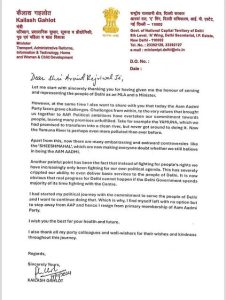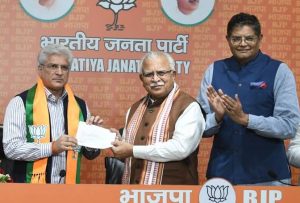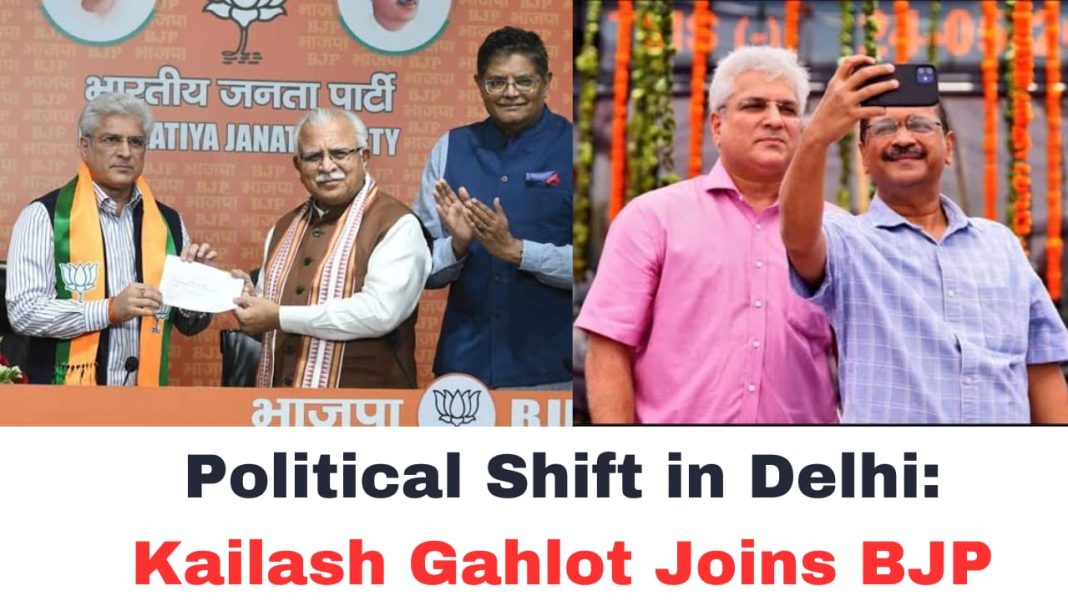Digital News Guru Delhi Desk:
In a significant realignment of Delhi’s political landscape, Kailash Gahlot, a prominent former minister in the Aam Aadmi Party (AAP), resigned from his cabinet position and officially joined the Bharatiya Janata Party (BJP) on November 18, 2024. This move is set to reshape the forthcoming Assembly elections in early 2025.
Key Background and Implications
Kailash Gahlot, once a trusted confidant of Arvind Kejriwal, has played a vital role in the AAP government, overseeing significant portfolios like transport, environment, and home. His tenure was marked by initiatives such as transitioning to electric buses and implementing measures to curb air pollution in Delhi. Gahlot’s departure is a considerable setback for the AAP, especially given his influence as a Jat community leader, a demographic critical to electoral outcomes.

The timing of Gahlot’s exit is notable. With the Assembly elections mere months away, the switch is poised to impact the voter calculus significantly. The BJP, which has been striving to gain a more substantial foothold in the Delhi legislature, is likely to benefit from Gahlot’s experience and community influence. This development follows the recent defection of Anil Jha, a former BJP legislator, to the AAP, highlighting a reciprocal reshuffling in both major parties.
Gahlot’s Critique of AAP
In his resignation letter addressed to Kejriwal, Gahlot pointed out that the party’s internal conflicts and constant tussles with the central government hindered essential governance. He noted, for example, that AAP’s much-hyped initiative to rejuvenate the Yamuna remained unfulfilled, a symbolic representation of the party’s faltering promises.
Gahlot did not shy away from criticizing his former party. In his resignation letter, he accused AAP of prioritizing political ambitions over public welfare. He labeled controversies, such as the “sheeshmahal” scandal concerning government expenditures on official residences, as “awkward” and “embarrassing.” Which he claimed damaged AAP’s image as a party for the common man.

AAP’s Response
Arvind Kejriwal downplayed the impact of Gahlot’s exit, stating that Gahlot was free to pursue his own path and that the party’s mission would continue undeterred. Kejriwal, while dismissive in tone, also defended AAP’s achievements, pointing to substantial developments in healthcare, education, and public services.
AAP leaders, like Durgesh Pathak, claimed that Gahlot may have faced pressure from central government agencies, alluding to ongoing investigations by the Enforcement Directorate (ED) and Central Bureau of Investigation (CBI) targeting several AAP leaders. Gahlot, however, denied these allegations, asserting that his decision was rooted purely in ideological disillusionment.
BJP’s Strategic Advantage and Gahlot’s Motivations
Gahlot’s defection represents a substantial gain for the BJP. For years, the party has struggled to dent AAP’s stronghold over Delhi, where Kejriwal’s administration has held power with a commanding majority. The BJP sees Gahlot’s induction as a double win: not only does it weaken AAP’s rural outreach, but it also adds administrative credibility to their Delhi team, which has often been criticized for lacking local leaders with governance experience.

During his induction, Gahlot lauded Prime Minister Narendra Modi’s leadership and vision for India. He expressed his intent to contribute meaningfully to Delhi’s development and argued that only through coordination with the central government could the capital realize its full potential. This alignment reflects a common criticism aimed at AAP: its frequent conflicts with the central government have often stalled projects and, according to Gahlot, compromised effective governance.
Political analysts view this move as a masterstroke for BJP, which aims to broaden its appeal among Delhi’s diverse voter base. Gahlot’s credentials, especially as a community leader among the Jats, could give BJP a boost in regions where AAP has traditionally excelled. However, critics argue that the saffron party’s strategy of wooing key opposition leaders instead of cultivating a homegrown leadership in Delhi reveals an ongoing struggle to resonate with the capital’s urban electorate.
The Broader Impact: Implications for Both Parties
Gahlot’s departure adds to a turbulent chapter for AAP, which has been grappling with mounting challenges. Apart from central agency probes and governance criticisms, the party is also facing internal dissent. Political observers suggest that Gahlot’s exit may encourage other disenchanted AAP members to rethink their loyalties, potentially triggering a ripple effect. For a party that built its identity on principles of integrity and reform, such defections can undermine public trust, especially if portrayed as signs of ideological decay.
On the other hand, BJP must convert this high-profile defection into electoral capital. Gahlot’s administrative expertise and local influence could be instrumental in the BJP’s campaign, but the party will need to work diligently to ensure this transition energizes voters. Additionally, the BJP will likely use this defection to criticize AAP’s governance failures and highlight the benefits of a harmonious center-state relationship for Delhi’s growth.
Conclusion: An Uncertain Road Ahead
As Delhi inches closer to the assembly elections, the stakes have never been higher. AAP must quickly address the narrative that it has become disconnected from its founding ideals, while BJP will seek to leverage Gahlot’s presence to present itself as a more stable and effective governing option. The electorate in Delhi remains highly discerning, and whether Gahlot’s move will have a lasting impact or simply add to the noise of campaign season remains to be seen. However, one thing is clear: the political battle for Delhi just became much more unpredictable and fiercely contested.
You May Also Read: The History Behind India’s Tallest Minaret: The Qutub Minar








